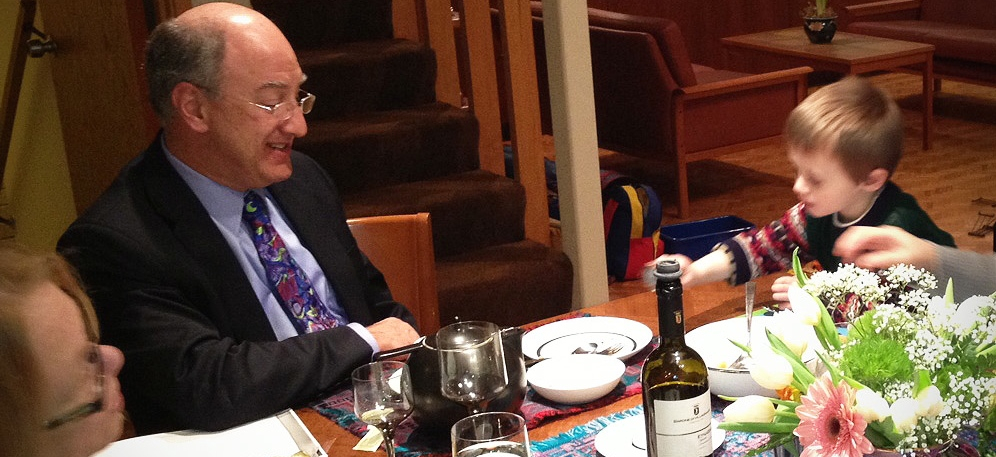Food and wine warmed the mouths and minds of the guests seated around the table. As the dinner progressed, those inhibitions that naturally guard our ability to speak candidly about faith and passions were slowly pulled away.
Conversations quickly escalated from introductions to more challenging questions ranging from, “Who do you think the next Pope will be?,” “What exactly is Kosher?,” and even, “So, why did you convert?”
I am honored to say that I was one of the guests participating in this dynamic dinner conversation, sponsored by the Niagara Foundation. The meal was the first of Niagara’s Abraham’s Tent Dinners, which are designed to promote dialogue, community and mutual respect among people belonging to the three Abrahamic faiths here in Chicago.
The Niagara staff selected me to attend the de-facto, inaugural dinner to give a sort of “unofficial Niagara blessing” and applaud the ambition of this pioneering group. And I’ll admit, I was a bit nervous.
I brought a plant with me as a host gift symbolizing new relationships. As I carried my little plant through the slushy streets on the way to the hosts’ home, I felt a tinge of uneasiness. I was apprehensive for two reasons: I was neither a “true member” of the religious tradition I was visiting, nor was I a full-time Niagara employee (I’m an intern). I felt like an outsider in Chicago’s frozen streets.
But that instantly changed when the front door cracked open. My eyes met the welcoming faces of the hosts, Lenore and Daniel Mass, and my nerves were quickly assuaged. The sweet smell of toasted rosemary greeted me inside.
I was the first dinner guest to arrive, but I quickly eased into conversations with my hosts, who are of reform Jewish background. I’m a Catholic, and I study interfaith dialogues, so I was eager to find a creative way to talk about our commonalities and differences. We discussed the sibling relationship between Judaism and Christianity, and we agreed that both of our traditions would do well to highlight their connectedness.
The rest of the dinner group arrived, and guests made up of several faith traditions, including Lutheran, Catholic, and Muslim.
Our assorted group filed into the dining room and circled around an elegantly dressed table to begin the dinner prayer and the lighting of candles. We read from prayer sheets written in Hebrew and in English, and blessed the wine and challah bread.
This ritual brought up an interesting story from the Jewish tradition that I had never heard. A napkin is placed over the two loaves of bread to ensure that the bread does not get jealous of the wine for receiving the blessing first. The two loaves represent the double manna provided to the Israelites by God during their wandering.
We began to pass around the platters that had been emitting enticing smells throughout the prayer. Fish was the main course, in keeping with the Christian guests’ Lenten practice. As we grazed, colorful conversation ensued.
I jumped into the chatter when I saw fit, but I my responsibility was to observe. I noticed that although comments between guests were authentic, sometimes one or two voices dominated the overall trajectory of the conversation. I had anticipated that with such a complex and layered conversation, between a mix of both introverts and extroverts, a facilitator would seem necessary.
But for the most part, I was mistaken. Commentary seemed to flow, one topic after another. A few times, a member of one faith made generalizations about the other that went unaddressed, but perhaps I was being oversensitive and hyper-aware, given my responsibility to the group. The jovial exchanges and constant laughter and smiles between participants would suggest anything but a damaging exchange.
The arrival of coffee, tea, and dessert to the table signified the near conclusion of our time together. I can’t speak to the personal experiences of the other attendees, but I can assure you that all left feeling a bit closer to people that were complete strangers only hours before.
I ventured back outside into the slushy streets, but this time, I was accompanied by one of my new friends, Gerald. He said, “You know, I never would get the opportunity to get to know those people if it wasn’t for programs like this.”
That’s precisely the goal of Niagara’s Abrahamic Tent Dinners. Seeds were planted in this exchange, and only time will reveal the fruit born from stepping outside one’s comforts and across boundaries in order to build new relationships. That little plant is a living testament to that.
Brendan Dowd currently finishing his MA in Theology with a concentration in Catholic-Muslim dialogue and the Catholic Theological Union. He is interning for the Niagara Foundation’s Department of Cultural Exchange and Interfaith Collaboration. Dowd is interested in exploring unique ways of creating spaces for encountering the “other” and learning from already existing confluences of convivencia. He received a BFA in Visual Communication with minors in Political Science and International Studies from Loyola University of Chicago in 2007 and is active in the former Jesuit Volunteer community of which he served in Anchorage, AK from 2007-2008.


